A high-quality household water softener is meant to last for a long time, but only if there is proper maintenance done and one of the most important ones is adding salt. However, that doesn’t mean you can add some random salt and call it a day, you want to ensure that it’s the best water softener salt.
Although buying water softener salts might seem like an easy job, it is actually a little more complex than just getting the largest bag in your local home improvements store. If you’ve done that, chances are, the salt that you get doesn’t have the best quality and you’re not getting the best value for money.
But don’t worry, keep reading this guide to discover the list of best water softener salt that we’ve compiled for you based on our research. However, before we dive deep into each water softener salt, we have prepared a guide to help you understand more about water softener salt and other information and knowledge associated with it.
Water Softener Salt and What it Does
In order for the ion exchange process to happen, sodium from the water softener salt is required. The salt is usually stored in a tank within the system and whenever water softening happens, it will be broken down into sodium. The complete form of salt is also known as sodium chloride, which is why it can be broken down into sodium during water softening.
Ion exchange processes happen in the tank that contains negatively charged resin beads. Hard water contains calcium and magnesium minerals which have a positive charge, which is why they will be attracted to the resin beads. Ion exchange happens when the minerals are pulled through and trapped by the resin beads.
The water softener salt will start working once the resin is packed with hard water minerals. The positively charged salt water will run through the resin tank and the sodium separates from the chloride to bind with the resin. As a result, the calcium and magnesium ions are forced to break away from the resin and will be flushed out of the system.
After that, the water will be free from calcium and magnesium, containing only sodium ions which give you soft water. Problems associated with hard water are usually caused by calcium and magnesium and sodium doesn’t cause any of that. Also, there is only a small amount of sodium added to your water during the ion exchange process.
How much sodium is needed for salt-based softening will depend on the hardness of water and all water already has different amounts of sodium present. Generally, if the hard water has more calcium and magnesium, then in order for ion exchange to happen, more sodium will be needed.
Salt For Water Softener vs. Potassium Chloride
Besides salt being the preferred mineral option for salt-based water softeners, potassium chloride can be used as well. Both sodium chloride salt and potassium chloride work in the same way inside the resin but there are some differences between them and let’s take a look.
Sodium chloride
As some of you may know, sodium chloride is the scientific name for the standard softener salt. It is usually sold in several different forms: crystals, pellets and blocks. In comparison to potassium chloride, sodium chloride is much more common and hence, sold at a cheaper price. Here are some of the different types of sodium chloride that you can get for the water softener.
Rock salt
Rock salt usually looks like pebbles or small rocks and has a high amount of calcium sulfate, and this type of salt isn’t the best for water softening. However, they are very cheap and accessible. Also, rock salt doesn’t always fully dissolve in water and can leave behind a residue.
Evaporated salt
The evaporated salt variation typically comes in the form of a pellet, having the highest purity rate among all the types of salt. As a result, this type of salt is pricier but is recommended for your salt-based water softening system. One of the benefits of pure evaporated salt is the low content of minerals which won’t cause any insoluble build-up in the resin tank, affecting the efficiency of the water softener.
Solar salt
Solar salt comes in either crystal or pellet form and is formed by solar evaporation of seawater, which makes it naturally pure. However, solar salt might not be the best choice for households with hard water because it’s not proven to effectively soften water that has a high level of water-hardening minerals.
Block salt
Block salt is literally a block of salt and this type of salt is seldom considered for water softening use but recommended by plumbing experts in some situations. If you decide to use block salt, just make sure the water level in your water softener resin tank is high enough to fully submerge the salt.
Potassium chloride
As we’ve mentioned earlier, another alternative for your salt-based water softener is potassium chloride. This salt replacement is able to provide the same water softening quality from the ion exchange process and in some cases, potassium chloride can be better water softening option.
You will realise that potassium chloride is offered at a much higher price than sodium chloride and this is because they are not as common. However, it does give the benefits of salt-free water softening and removing calcium and magnesium at the same time.
With potassium chloride, you can be as close as 99.9% sodium-free. This is especially a good alternative for anyone that is on a low sodium diet or doesn’t enjoy the salty taste of sodium in their water. Besides that, sodium chloride soft water is not recommended for watering plants but potassium chloride soft water is. Plus, it’s safe for pets to drink potassium chloride soft water.
Other than paying a premium to get the benefits of potassium chloride, you are also expected to enhance the programming settings of your softening tank by 10 to 15%. This enhancement is to ensure that you are getting the water softening benefits as you’re able to form sodium chloride.
Difference In Water Softener Salt : Crystals vs Pellets
You might have come across different forms of salt with different purposes and prices but you might think that they don’t have too big of a difference. Well, that’s not the case, so we think you should know what each type does. The two major forms of salt are crystals and pellets, other forms are not recommended for water softener use so they won’t be covered.
Crystals
Salt crystals, or otherwise known as softener crystals, are technically evaporated salt through solar. This process takes place when a mixture of salt, brine and water is exposed to the wind, eliminating the water and leaving the salt only.
Salt crystals usually appear white and have a hard texture. They are good for you if you don’t use water that much on a monthly basis, or if you have a two-part water system. Using crystals on systems with higher water usage form salt bridges, which are hard crusts formed in the brine tank. It doesn’t allow salt to fully dissolve in the water due to the empty space formed between the salt and the water. Without sodium-brine water, the resin beads won’t work properly.
Pellets
Salt pellets are also made through the process of evaporation with water and steam to form crystals. After the crystals are dried and screened, they will turn into pellets. Citric acid is commonly added to pellets and it acts as a cleaning agent to prevent the build-up of minerals in water softening systems and pipes. You should note that citric acid doesn’t change the quality and taste of your soft water.
For any homes with high water consumption, pellets are recommended so if you use water at an above-average rate, you can benefit more from using pellets in the water softening system. It is also a great choice for all-in-one tank systems.
How to know when the Water Softeners need Salt?
We all know that salt-based water softeners require salt to function properly, but knowing when to add salt isn’t as simple as it sounds. Don’t be afraid, there are actually easy ways to know when you need to refill the brine tank.
Although there are some factors that are easily spotted when refilling your tank, you still have to understand that the brine tank size and type of water softening system influences how much salt you need every month. Water hardness is also another factor that affects how quickly and how much salt is needed.
Regardless of the type of water softener you own, here are some of the things that you can look into as a guide to know when your salt needs to be refilled.
Salt levels are obviously low
The easiest and most straightforward way to determine if your water softener needs refilling or not is by physically looking at the salt levels in the brine tank. You can do so by lifting the lid and examining what’s left inside. Usually, when salt levels are below half, it would be recommended to refill it. Do not let the salt level drop below one quarter to maintain the system effectiveness.
The water softener is old
Typically, a new water softener requires a refill every 6 weeks to 2 months, but if the model you own is old, then you might need to check the salt level and refill it more frequently. An older model water softener will usually consume more salt than a newer one because many water softener manufacturers nowadays design their products to be more efficient at ion exchange, hence, reducing the need for a frequent salt refill.
Bridging in the tank
There are times that your water softener is not effectively softening the water and you might think that it requires more salt. However, that might not be the case as there could be a bridging situation in your tank.
Bridging is when there is a hard and crusty layer of salt-forming at the bottom of your brine tank, preventing the salt below it to be dissolved in the water. As a result, there won’t be enough sodium ions in the water to carry out the ion exchange process. To avoid this, make sure your softener is in a low humidity area, use good-quality softener salt and keep the brine tank half-full.
What to Consider When Buying The Best Water Softener Salts
To aid in the process of buying the best water softener salt, here are some aspects that you need to consider.
Budget
Firstly, you should think about how much money you intend to spend on buying salt regularly. This will be a factor that affects the brand of salt you go for. Normally, most brands offer their salt at a cheaper price if you buy a higher quantity of salt at once. However, there are some brands that sell salt at an unreasonably high price.
For anyone with high water usage, you should expect to pay a higher price for various forms of salt that are better. You can also consider buying salt from the manufacturer of your water softener because some of them offer a discount or some deals that help you save some money. Regardless of where you’re getting the salt, just make sure the seller is reputable and the product is legitimate.
Softener maintenance
The next thing to consider is how much maintenance you will need for your water softener because you need to fill up your sodium tank regularly to keep it functioning efficiently. You should also let your tank regenerate when required and be sure to check the system on a regular basis.
Some water softener salts on the market can cause bridging or build-up of salt at the bottom of your brine tank, causing the system to be inefficient. In those cases, you will have to break up the build-up to let the salt fully dissolve in the water.
Taste of water
Although water softeners that use salt only add a tiny amount of sodium to the water, some people might not prefer the taste of sodium-softened water if they are more selective with their drinking water.
To deal with that, getting potassium chloride salt is highly recommended because it doesn’t have the salty taste that sodium chloride has. However, they will usually cost almost three times as much as sodium chloride, but you do get more benefits from softening your water with potassium chloride.
Water hardness of household
You should understand the harder the water of your household, the faster you will use up the softening salt. Hence, water hardness is one of the most crucial factors affecting the types of softener salts you will be getting.
Hard water usually consists of a higher density of calcium and magnesium minerals and you might need more salt to replace the minerals. This also means you will be using salt at a higher rate. However, there isn’t much you can do or change about your water hardness, other than buying salts in bulk to reduce overall cost.
Water softener type
The best water softener salts are applicable in almost all types of water softeners but do read the description first before making a purchase. Typically, evaporated salt, solar salt, rock salt and occasionally block salt can be used in a salt-based water softener.
It’s also very obvious that you only need salt if your water softener requires salt and salt-free water softeners are basically, salt-free, so it doesn’t require any salt. They usually function with a TAC media that deals with calcium and magnesium, preventing limescale build-up.
Maintenance of Brine Tank
Your job with a water softener doesn’t just end at buying and refilling salt into it. To ensure you are consistently getting soft water, you have to carry out brine tank maintenance on a regular basis to make sure that your system is working normally. Here is some of the maintenance information that will come in handy:
- Checking the salt level of your brine tank. A good practice for maintaining your brine tank is to check the salt level every month, ensuring that it isn’t too low or the system won’t have enough sodium to function properly. To avoid the hard-causing minerals from passing through the resin and causing ineffective water softening, make sure you add salt every time the system regenerates.
- Ensure there is enough salt in the tank. The recommended level of salt is at least 4 inches higher than the water level and if it drops below that, then it’s time for a refill. Besides that, you can also keep your salt at roughly 4 inches below the lid or top area of the brine tank. Be sure to do proper calculations to avoid excessive sodium levels.
- Make sure the system is working properly. To make sure that your system is still functioning as it should, the tank should never be less than one quarter full of salt. Otherwise, the system wouldn’t be working as it should. Check the level of salt regularly to avoid this.
- Dealing with bridging. If you find a hard and solid layer of salt at the bottom of your brine tank, it means there’s bridging in it. You should break it apart to let the salt mix with the water properly. The easiest way that you can deal with it is to pour hot water over the layer and it should fall apart.
Maintaining a brine tank isn’t something difficult, just a matter of checking up on it on a regular basis and refilling whenever it’s necessary. Other than that, it also involves settling issues before they turn into bigger ones. Keeping up with this good practice can extend the life of your softener and get consistent water softening.
Method to Add Salt to your Water Softener
You will find that your water softener will regenerate on its own when there’s sufficient salt in the tank. The regeneration happens when the water is flowing back through the water softener and clears out impurities to prevent rust and other problems.
The regeneration process usually happens at a fixed time and it’s typically at a time when you don’t need your softener such as the middle of the night. The time taken for the system to regenerate usually takes about 10 to 30 minutes. However, if there isn’t sufficient salt in the system, you might have to regenerate it manually.
To do so, you will need to prepare a piece of cloth or a rag and the salt you want to use for your water softener. You should begin with cleaning your brine tank using a wet cloth or rag to get rid of the build-up of brine and salt within the tank. Ensure that the tank is as clean as possible before you proceed with adding more salt.
After that, you will have to add more water to the tank and remember to keep the water at the recommended level based on the instructions from the manual. Next, add salt into the brine tank to the recommended level that we’ve mentioned. While adding the salt, make sure that the salt is loose and break apart any chunks of salt.
Lastly, search for the control panel of your system and activate manual regeneration. You should also avoid using water during regeneration.
For anyone that regularly refills the tank, it is also recommended to clean out the tank at least once in a while to ensure that it’s working effectively and to extend the service life of the water softener.
Reviews of The Best Water Softener Salts in 2022
Now that you know more about water softener salts, we can move on to the list of the 6 best water softener salts on the market.
1. Morton Salt 1501
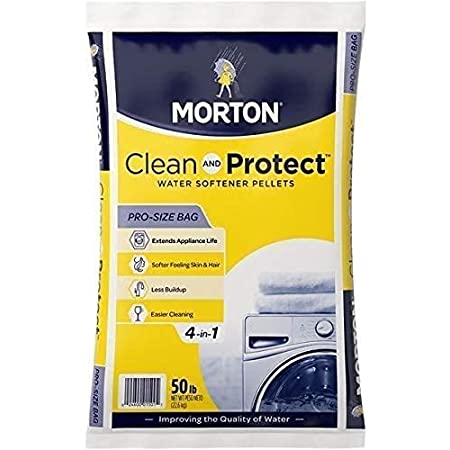
Specifications
- 50 lbs
- Manufactured in US
- Package dimensions: 18.0” x 16.0” x 10.0”
Features
First, on the list of the best salt for water softeners, we have the Morton Salt 1501 Clean Protect System. The Morton Clean and Protect salt is one of the best selling salt for softeners on the market because of how easy and simple it is to use it. It even received a rating of four and a half stars, which makes it incredible.
Using the Morton Clean Protect salt is easy because all you have to do is open the bag, take out as much salt as you need and pour it in your water softener to turn hard water soft. Besides that, the Morton Clean Protect can also protect your appliances such as water heaters from getting rust.
Showering with hard water can cause some serious damage to your skin and hair. Thankfully, with this salt, they can be rejuvenated and you’ll get a better shower experience. Plus, it also ensures that you can wash your clothes with much softer water.
You will like this product if:
You are looking for water softening salts made in the US. If you’re searching for easily accessed salts, then the Morton Clean Protect would be the best choice because it’s made in the US.
You want to enhance the durability of your appliances. After using this salt to soften your water, you can expect a lower chance of damage done to your appliances.
You want to improve your health. The Morton Clean Protect salt turns hard water into a softer one to ensure that your drinking and shower water is safe, protecting your health.
You will not like this product if:
You don’t prefer a heavy bag. This is a 50-pound bag which can be quite heavy for some customers.
2. Morton Softener Salt
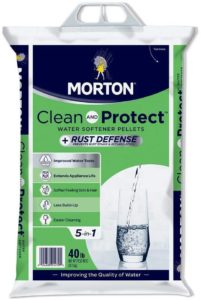
Specifications
- 40 lbs
- Rust defense
- Package dimensions: 19” x 13” x 4”
Features
It shouldn’t come to you as a surprise to see another one of Morton’s products on this list. Similarly to most of their products, the Morton Salt Morton F124700000g Water Softener Pellets comes at a slightly expensive price. However, if you ignore the price, you will notice the incredible traits that it offers.
For starters, the bag is durable and can keep the salt secured from the surrounding environment. Plus, the weight is 10 pounds lighter than the previous one, making it easier to be carried around. The Morton salt pellets can do more than just improving the taste of your water. It can also help to prevent rust stains on your appliances and laundry.
Despite the hefty price tag, the Morton F124700000g Water Softener Pellets is an incredible salt for water softeners thanks to the improvements it brings for your water and appliances.
You will like this product if:
You intend to protect your appliances and laundry against rust stains. The Morton salt pellets are effective in preventing rust stains on your appliances and laundry which ensures the longevity of your appliances too.
You prefer having durable salt bags. The bag is made with a good-quality material to make sure that it can be carried around without breaking easily and to keep the salt pellets protected.
You want to prevent scale build-up. This water softener salt is able to prevent scale build-up in pipes and appliances such as water heaters and dishwashers.
You will not like this product if:
You have a stricter budget. As compared to other water softener salts, the price of this salt is considered to be at the higher end, which might not be the best option for you if you’ve got a tight budget.
3. Cargill Salt
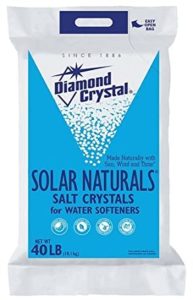
Specifications
- 40 lbs
- Solar water softener salt
- Packaging size: 24” x 16” x 3.8”
Features
Cargill is one of Morton’s greatest competitors and with the Cargill Salt 7304, they aim to provide a better water quality for their customers but also at a cheaper and affordable price. Just like all the softening salts on this list, this solar salt by Cargill is able to turn hard water into soft water with maximum effectiveness.
As some of you already know, soft water is good for your health but at the same time, this water softener salt by Cargill can also improve the life of your appliances by ensuring that they are free from rust.
Thanks to the diamond crystal-shaped salt pellets, they can efficiently go through the ionization process and turn hard water into soft water. Plus, the salt can ensure that there won’t be any stains in your kitchen or washroom. Regardless of your water hardness, the Cargill salt pellets will impress you when you’re washing clothes or dishes.
You will like this product if:
You are looking for something that works better than rock salt. This water softener salt by Cargill is made to be more efficient and cleaner than rock salt.
You fancy the moisture protection that the packaging offers. You can expect your salt to be well-protected from moisture thanks to the packaging design.
You prefer the quick ionization process. With the diamond crystal-shaped salt pellets, the ions are able to work quicker, resulting in a faster softening process.
You will not like this product if:
You expect it to be a lot better than Morton. The price of this is only slightly cheaper than Morton and its quality is not from Morton either, so it might disappoint you if you have high expectations.
4. Morton Pure Natural Salt for Softeners
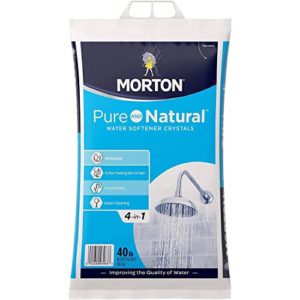
Specifications
- 40 lbs
- Sturdy plastic handle
- All natural, high purity salt crystals
Features
The Morton U26624S Pure and Natural is another series by Morton that is loved by many users. Unlike the previous versions which are water softener salt pellets, the Morton U26624S Pure and Natural comes in the form of crystals. Also, it is a natural salt and has high purity, perfect for a household with hard water and requires a pure and natural solution.
With the Morton U26624S, you can expect a decrease in the build-up that hard water causes and at the same time, clean and protect your water softener appliance. The bag is also made to be sturdy with a hard handle that doesn’t rip apart easily when carried around.
In addition, using this water softener salt can also let your hair and skin feel softer after washing and bathing. The softened water not only helps to prevent dryness of your body, but it can also make it easier to clean dishes, glasses and faucets.
You will like this product if:
You are looking for a water softening salt that is made naturally. This Morton Salt is a natural and pure sodium chloride with a higher-than-average purity.
You want to clean your dishes easier. After using this salt, you will notice that cleaning your dishes will be much easier because of how this pure salt softens the water.
You intend to extend the lifespan of your water softening appliance. The performance of this water softener salt is able to increase the life of your appliance, which is your water softener.
You will not like this product if:
You don’t like the smell of sulfur in your water. The smell of sulfur is very minor but some users are sensitive to it and this would not be the best salt for them.
5. Diamond Crystal Salt
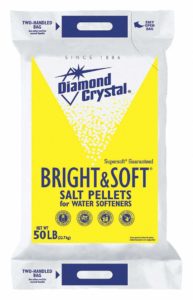
Specifications
- 50 lbs
- 99.8% purity
- Patented two-handle bag
Features
This versatile salt, Diamond Crystal Salt Water Softener Salt Pellets, is one the best salt for water softeners because of its 99.8% purity. It makes the salt effective in the regeneration of resin beads in your water softener because it is almost fully soluble, which makes it easy to hold magnesium and calcium and it aids in speeding up the regeneration of resin beads.
As a result that, using this salt means your household water will have a higher level of softening. The Diamond Crystal Salt is made to ensure that bridging doesn’t happen and this will help to extend the lifespan of your water softener and also improve the ability of your water softening system.
Compared to the other water softening salts, the Diamond Crystal Salt utilized a bag design that is unique and convenient. It has two handles which most bags of salt don’t have, making the Diamond Crystal easier for users to lift and refill their water softener’s brine tank.
You will like this product if:
You are looking for a water softener salt that softens hard water with great efficiency. This is one of the best water softener salts that is made to be almost fully soluble in water which is efficient in turning water with great hardness to soft water.
You want a softening salt that extends the life of water softeners. The life of water softeners is extended when using this salt because this softening salt is made to ensure that bridging doesn’t happen in water softeners.
You will not like this product if:
You have a tight budget. Compared to most salt for water softeners, this is offered at a higher price tag and might not be the best water softener salt for you.
6. Diamond Crystal Water Softener Bag
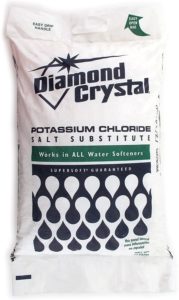
Specifications
- 40 lbs
- Potassium chloride salt
- Package Dimensions: 24” x 16” x 4.25
Features
The final best water softener salt is the Diamond Crystal Water Softener Bag but unlike the other salt for water softeners which is sodium chloride, the Diamond Crystal Water Softener Bag contains potassium chloride pellets. This is definitely one of the best salt for water softeners with an incredible 5-star rating.
This sodium-free salt is the perfect option for any household that contains pets and plants. With this salt in water softeners, you can expect it to clean your clothes and dishes no matter what water hardness your house contains. This softening salt is also perfect for protecting water softeners against rust stains and clogging issues.
Since it is a potassium chloride water softening salt, the price it’s offered at is also higher than the typical salt for water softener systems. However, the perks you are receiving from potassium chloride pellets definitely outweigh the cons.
You will like this product if:
You want a water softening salt that cleans your clothes effectively. Since this salt is able to soften water with great effectiveness, it can allow you to clean and brighten your clothes.
You want to prevent hard water issues. Issues such as staining and clogging of pipes and valves can be avoided using this water softener salt.
You will not like this product if:
You don’t want an expensive softener salt. Since this type of salt is not as common as sodium chloride, the price is also higher and might be out of your budget.
Frequently Asked Questions (FAQs)
How long do water softeners last?
The service life of water softeners depends on the manufacturer, the quality of the parts and also how much you paid for the water softener. Newer models of water softeners tend to have better durability than older models, but with good care and maintenance, a water softener should be able to last up to 20 years.
Is it fine to mix various types of salt in the water softener?
Refilling on a monthly basis means you might come across using different salts for your water softening system. However, you don’t have to worry because it is not much of a problem.
Most manufacturers make their water softener system with the expectation that you will be using more than one brand of salt in the system, so it is safe to say that you can mix the salt in your water softener system. However, it would be best to mix the same type of salt only and not other salt types to prevent clogging up the salt pipe.
Is soft water safe to drink?
Yes. Softened water is free from hard-causing minerals and has a mild alkaline taste, but the water quality isn’t affected so it is safe to consume.
Can I use pool salt in the water softener?
Yes but pool salt may not the best water softener salt option. The best water softener must be accompanied with coarse type of salt to clean and protect the working of the water softener salt. Note that pool salt is more fine than regular table salt used for water softeners. Hence, the flow rate of the water may be disrupter and work less effectively.
Bear in mind that using pool salt can make your drinking water taste more salty and undesirable. This is reasoned as pool salt can prevent the bring from leaving the tank so brine would be present in your drinking water.